Alchemy at Work: Being on the Frontlines of your Industry

“I am not afraid of an army of lions led by a sheep; I am afraid of an army of sheep led by a lion.” (Δεν φοβάμαι ένα στρατό λιονταριών που διοικούνται από ένα πρόβατο. Φοβάμαι ένα στρατό προβάτων που τα διοικεί ένα λιοντάρι.) – Alexander the Great (Μέγας Αλέξανδρος).
To shine as a leader in today’s gig economy and to stand tall on the frontlines of your given industry, you must first understand what kind of leader you are at this very moment. Knowledge of your strengths and weaknesses will inevitably make you more self-aware of your current capabilities and what you can do to thrive.
Originating in the 1920s from the slang for ‘musical performance’, ‘gigs’ tend to involve fewer stages and musical instruments in the world of business. 100 years on, and gig work still centers around short-term presentations of skills, but nowadays, the nature of these performances has become diverse to the extreme, veering away from the theatrical. Instead, the high demand for side hustles and freelance work has established a gig economy, an economic system in which temporary employment is prevalent, as opposed to permanent contracts.
Employers benefit from the service-driven results and hassle-free approach to gig work (there are no full-time employees to worry about!), and gig workers benefit from flexible hours, task diversity, and remote access. But it’s not all sunshine and rainbows.
Gig work tends to anonymize the gig workers. If you want to find success, make a name for yourself, or lead others towards a cause you believe in, you have to shine under the spotlight. But how can you ensure the spotlight is pointing towards you? How can you differentiate yourself from your competitors? How can you thrive as a leader?
Leadership 101
American authors David Rooke and William Torbert not only recognized that leadership could take seven different forms but, after years of ground-breaking research, they were able to rank them from least to most efficient. Now known as a leader’s action logic, these seven styles dictate how individuals respond to external stimuli such as challenges and threats. One evolves into the other as leaders finetune behaviors that begin as instinctual and recalibrate their dominant way of thinking.

According to Harvard Business Review, approximately 55% of leaders are Opportunists, Diplomats, and Experts, 30% are Achievers, 10% are Individualists, 4% are Strategists, and just 1% are Alchemists – the most successful leaders of all.
Advancing up the ranks
Although the action logic model appears to be a linear ladder of progression, there are, in fact, myriad pathways that one could take to ascend to the top 1% of leaders. Through necessity, we learn how to be an Opportunist and a Diplomat on an instinctual level – we create opportunities and build relationships with our colleagues from the moment we enter the workforce. As we rise up the ranks, we often develop a sharper eye for potential opportunities; this helps us to continue evolving at a higher level. To become a more efficient leader, however, takes significant conscious effort.
The simplest way to advance is to signpost yourself as an Expert in your desired field. Rather than trying to control the world around you, redirect your focus to perfecting your knowledge. Use hard data, logic, and rational thinking to support your strategic moves and gain widespread support. By putting yourself in the public domain, becoming an active member of a prestigious professional organization, hosting events, and publishing articles that showcase your expertise, you will successfully become a reference point to others.
Differentiating yourself from other Experts in your field can only be done by taking a leaf out of an Individualist’s book. Individualists know how to deliver results (as Achievers) but – crucially – they also consider how to deliver anticipated results. To do this, they add additional S-curves to their arsenal which combine expertise from across sectors. This interdisciplinary approach to success is the only way to truly thrive in today’s gig economy.

The best Individualists have a unique set of S-curves that are difficult to imitate when combined. They study strategies that teach them how to turn their focus from the internal to the external. These Strategist skills can elevate individuals in isolation but work best when engaged in mutually beneficial peer-to-peer development.
How can you become an Alchemist?
The final progression takes an already capable and effective leader into the realms of world-shaping and pure innovation. Alchemists have the extraordinary capacity to reinvent themselves at will: they can interact with ‘kings and commoners’ simultaneously, handle a short-term crisis without ever losing track of the long-term goal, and use their expert self-awareness skills to radiate charisma at every turn.
To become an Alchemist, to progress from a good leader who blends into today’s gig economy to a great leader who stands out, we must respond successfully (and fearlessly) to change. Not only must we be Experts in our fields, but we must combine our expertise in unique ways that differentiate us from others. Together, our cocktail of S-curves, skills, and experiences must be inimitable.
Alchemists, like Nelson Mandela (to use Rooke and Torbert’s example), have been transforming nations and businesses for centuries, but why let alchemy remain a thing of the past?
In an unstable gig economy, Alchemists don’t just solve problems; they critically examine them from every angle, deliver interdisciplinary solutions that stand the test of time, and prevent problems from occurring in the first place.
You see, the quality of the gig is not dependent upon the musician’s pure talent alone but on how they use it. We, as performers in the gig economy, must learn to realize our talents and put them to work flexibly. Reassessing and recombining our aptitudes and skills, we address each gig with a new performance: we showcase ourselves and harness opportunities as platforms, as stages, upon which we can shine.


Written by Naila Mehrabova. Also read: Success vs. Genius: How CEOs Can Sustain Genius in the World of AI.
Have you read?
Countries: Women in the workforce. Countries: Personal space. World’s Most (And Least) Religious Countries. Best Countries to Invest In Travel, Tourism, and Hospitality. Most Forested Countries In The World.
Bring the best of the CEOWORLD magazine's global journalism to audiences in the United States and around the world. - Add CEOWORLD magazine to your Google News feed.
Follow CEOWORLD magazine headlines on: Google News, LinkedIn, Twitter, and Facebook.
Copyright 2025 The CEOWORLD magazine. All rights reserved. This material (and any extract from it) must not be copied, redistributed or placed on any website, without CEOWORLD magazine' prior written consent. For media queries, please contact: info@ceoworld.biz








